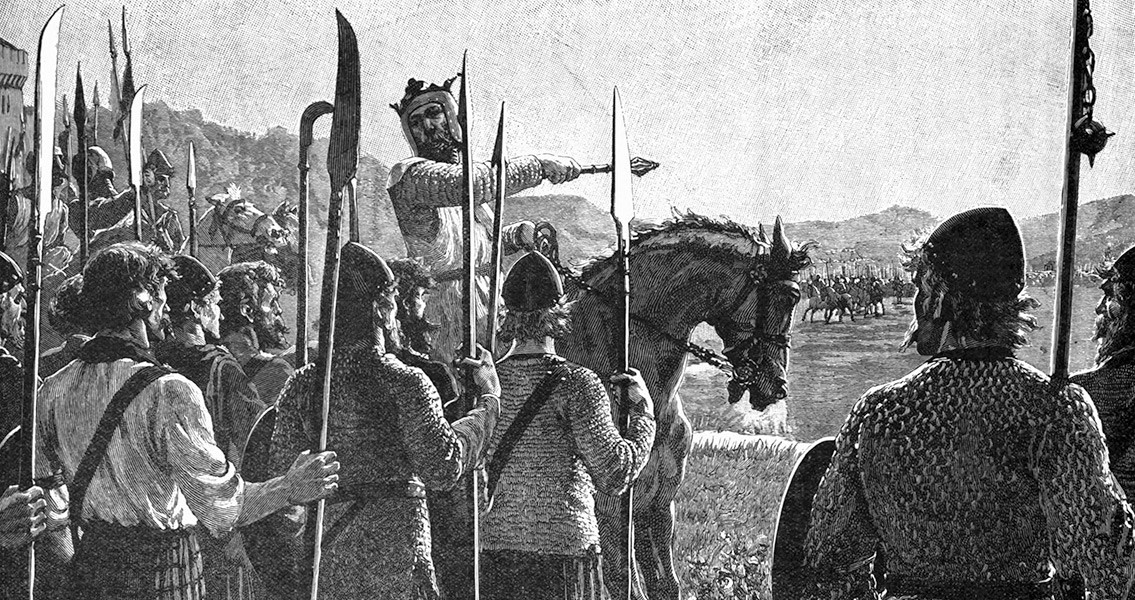<![CDATA[On 24th June 1314, the Battle of Bannockburn came to its violent conclusion. For many Scots it is considered the most important day in their country's history, a crucial victory in the War for Independence when the Scottish and English kings led their armies into battle against each other. A hard fought, unlikely victory for the Scottish King Robert the Bruce helped reestablish the independence of the Scottish monarchy. For Edward II it was a humiliation which undermined his credibility as a king, fostering the dissatisfaction and lack of confidence that ultimately culminated in him being deposed years later. The origins of the battle, and the Scottish War for Independence itself, had started forming years before. Robert the Bruce had actually supported the English invasion of Scotland led by Edward II's father, Edward I, in 1296. A rival of King John Baliol for the throne, Robert supported the English in the hope of making Baliol abdicate. Although successful, the victory saw Scotland ruled as a province of England. Shortly after, Robert became involved in the uprising led by William Wallace against English rule. When Wallace was eventually defeated, Robert somehow escaped the severest punishment, being allowed to keep his lands and even being appointed a guardian of Scotland. In 1306, he made his own claim to the throne, and was crowned at Scone. The response from Edward II was swift. Robert was deposed, his wife and daughters were imprisoned, and his three brothers were executed. After hiding out for the winter, Robert launched a highly successful campaign of guerrilla warfare against the English, motivated by a desire to free his family and win independence for Scotland. Recruiting other Scottish nobles to his cause, Robert had all but driven the English out of Scotland by June 1314, and his forces made their way to the final stronghold, Sterling Castle. With the castle on the verge of surrender, Edward was forced to muster an army and march into Scotland, leading the biggest English military action in Scotland in the history of the two countries. The scene had been set for one of the most dramatic battles in history. The Scottish forces were outnumbered, two to one, and were facing the superiorly equipped English Army, regarded as one of the finest of the Medieval era. The massive English cavalry, in particular, presented an ominous threat to the Scottish forces. Several small skirmishes took place on the 23rd June, most notably when an English cavalry charge attacked a small group of Scots that included Robert himself. The Scottish king killed the English knight, Sir Henry de Bohun, striking him with his axe, and forcing the cavalry to withdraw in a major morale boosting victory for the Scots. On the 24th June, the main battle took place. Robert had deliberately chosen the area near the Bannockburn, marshy land that would restrict the movement of the English cavalry, nullifying one of Edward's forces' crucial advantages. The English forces camped out at the Carse of Stirling, enduring a difficult, morale sapping night in the poor conditions. The following morning, the main battle took place. The Scottish army advanced, led by three schiltrons - groups of spear wielding men marching in unison, essentially making a moving wall of spears. The English were not equipped or prepared to deal with the tactic. Robert's men advanced ruthlessly, forcing the English forces into a chaotic bottleneck by the Bannockburn. The English troops attempted to retreat back across the river, ending in lethal, bloody chaos as the schiltrons continued their advance. Edward, sensing the hopeless situation, fled, escaping to Dunbar Castle and then sailing to England. Most of his troops were not so fortunate, stranded far beyond the England-Scotland border, thousands were killed or captured. Following the victory, Robert the Bruce was able to negotiate the release of his imprisoned family members in exchange for the English forces captured at Bannockburn. Edward still refused to recognise Scottish independence, but the victory sent a powerful message of Scottish resilience, eventually culminating in the peace of 1327 which saw England renounce all claims over Scotland. ]]>
Robert The Bruce Wins The Battle of Bannockburn
